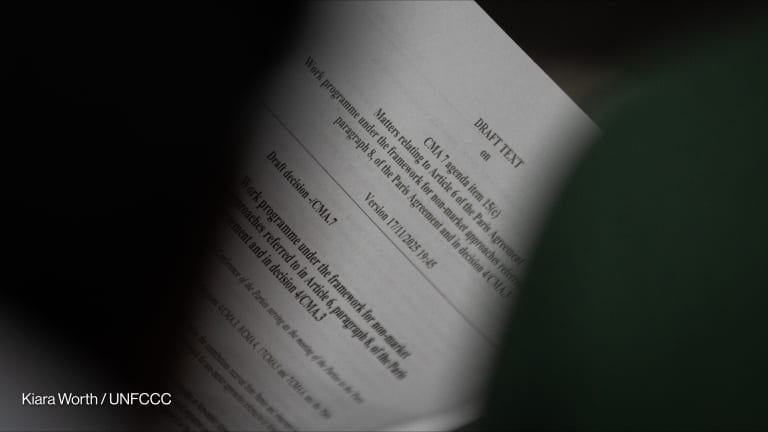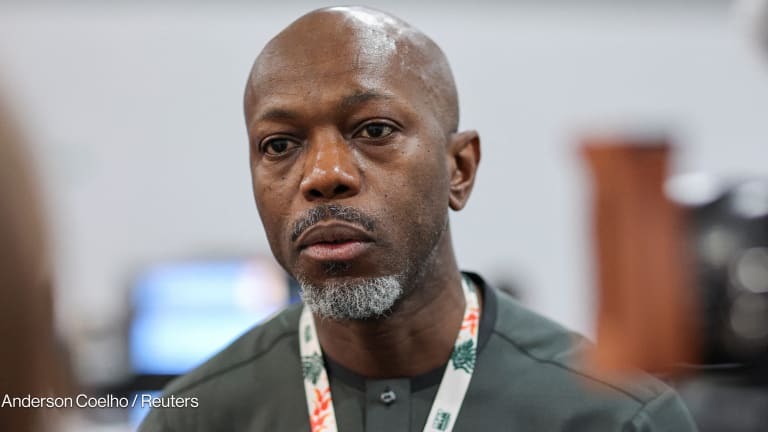The 3 big outcomes of COP30’s final plenary
The conference ended with no words on fossil fuels and weak language on adaptation finance, but multilateralism prevailed.
The final plenary of the 30th United Nations Climate Conference, or COP30 in Belém, Brazil, almost fell apart on Saturday — a day after the official conference was set to end. The conference’s president, André Corrêa do Lago, had already formally approved several important elements of the negotiations when representatives of Colombia spoke up with an objection. "Colombia wants to move forward,” said negotiator Daniela Durán González, “but you are leaving us with no other option.” She said the country could not accept the agreement unless language about a fossil fuel phaseout was included in the text. In a process only decided by consensus, negotiators scurried to find a solution, with the U.N. Framework Convention on Climate Change and Brazilian COP30 presidency trying to figure out whether they could legally “un-gavel” issues; and Colombia, Saudi Arabia, and another negotiator from Brazil in a huddle trying to find a mutual way forward. As the presidency took a break to discuss, whispers circulated the plenary room about what reversing an already-gaveled decision would mean for the integrity of the COP process as a whole. To many in the room it felt, momentarily, like the presidency was one decision away from dismantling the most important mechanism for international climate cooperation — if these decisions could be taken back, it might mean previous commitments were also up for debate. Ultimately, the presidency apologized and kept the decisions in place. There would be no language in the final document about phasing out fossil fuels. This was seen as a step backward from the COP28 decision two years ago for “transitioning away from fossil fuels.” “These are always painful, difficult and frustrating processes,” Ed Miliband, U.K. secretary of state for energy and climate change, told reporters. “But the world is moving forward and that’s really important.” The battle over a fossil fuel phaseout The last-minute sticking point had been under discussion throughout the two-week conference. COP30 opened earlier this month with a strong call for a phaseout of fossil fuels from Brazilian President Luiz Inácio Lula da Silva. “We need roadmaps that will enable humankind, in a fair and planned manner, to overcome its dependence on fossil fuels, halt and reverse deforestation, and mobilize resources to achieve these goals,” Lula said. On one side of the debate this week stood the European Union, Colombia, and several other nations trying to secure concrete wording to phase out fossil fuels. Columbia and the Netherlands led a 24-member initiative to start a fossil fuel phaseout yearly conference, which will take place in Colombia in April. On the other side, oil-rich Gulf states and low-income African countries that want to be able to tap into their own resources for economic development, the same way wealthy countries such as Norway and the United States did long ago. “Transitioning away from fossil fuels should adhere to the principles of common but differentiated responsibilities,” said a Nigerian negotiator in the final plenary. “Economic reality must also be respected … A successful transition cannot be imposed.” Tripling adaptation finance … sort of Countries in the global south wanted to see a tripling of the $40 billion in adaptation finance promised back in 2021 during COP26 in Glasgow, Scotland — but the chances were low. “It ain’t gonna happen,” one delegate from a high-income country told Devex. The final text agreed at COP30 does include a call to triple adaptation finance by 2035 — an eased deadline from an earlier draft that specified 2030 — but does not specify that wealthy countries must take on that financial burden. Instead, it “urges developed country Parties to increase the trajectory of their collective provision of climate finance for adaptation to developing country Parties.” “We don’t really know what that means,” Joe Thwaites, senior advocate of international climate finance at the Natural Resources Defense Council, told Devex. In addition, the text doesn’t specify a baseline from which tripling should happen. Lower-income nations hoped that the baseline would be 2022, which was when adaptation finance hit almost $33 billion. Now, the assumption is that it could be from 2025 numbers, which is likely to be lesser than 2022 due to tighter budgets. More importantly, the data on 2025 adaptation finance flows will take two years to collect. Either way, even tripling the 2022 baseline is expected to fall far short of what is needed for adaptation in developing countries. The United Nations Environment Programme puts the annual need at $310 billion per year. Parties had prepared to talk on two elements of adaptation: a list of measurements to track progress, and where to get the money to finance it. At the end of the two weeks, lower-income countries won the term “tripling,” but were concerned with the loose timeline and the lack of explicit language that the money would come from wealthy countries. Some lower-income countries felt that they were being saddled with a list of indicators requiring them to track progress they had no money to make. Overall, the final text included 59 indicators — an impressive reduction from the nearly 10,000 that countries began with over five years ago, and the 100 they came to COP30 with. They include measurements such as the proportion of water and sanitation infrastructure systems that are resilient to climate-related hazards, or the proportion of the population with equitable access to adequate food and nutrition. The idea is for these to be implemented over the next two years. But countries from Latin America, the European Union, and Canada were unsatisfied by the final list, and disillusioned by the fact there was no financial promise to help countries meet them. The main issue is “how the indicators shaped up,” Debbie Hillier, head of the Zurich Climate Resilience Alliance Programme at Mercy Corps, told Devex, adding that technical experts had worked for two years to produce 100 indicators through an inclusive and transparent process. But the COP30 presidency reduced them to 59 in the final days of the conference, with “only a handful that resemble the original proposals by experts,” said Hillier. “Many merge diverse concepts into single statements that will be hard to fashion into new and realistic indicators. The result is lack of clarity and measurability.” They were especially disappointed to see no specific mention of finance included in the list of indicators. “Saying these indicators create no financial obligations when we all know that the Global Goal on Adaptation and adaptation plans cannot move without finance makes the entire exercise meaningless,” a negotiator from Panama said during the plenary after the text was accepted. “We do not accept the decision. We understand that maybe our hand was not seen, but we raised our flag before the decision.” Following a pause in the negotiations to discuss the more fundamental issue of do Lago ignoring efforts at interventions, the COP30 president said that there will be further work on the adaptation indicators at climate talks in Bonn, Germany, in 2026. Brazil remains the president of the process until Turkey takes over at the start of COP31 next year. The text also includes that there will be a continued effort to further refine the indicators in a plan called the “Belém-Addis vision,” referring to the plan for COP32 to be held in Addis Ababa, Ethiopia, in 2027. “We have reduced this whole exercise to indicators,” a negotiator for the Africa group told Devex. “They are really good and we need them, but they are not the main thing. We need support and finance.” A promise to keep talking The more general debate on getting more total climate finance continued this year, but with shrunken aid budgets and more of national budgets going to defense. Ultimately, lower-income countries got a promise of a two-year “work programme” to continue discussing climate finance — meaning that representatives will have to keep discussing it through workshops, new technical papers, reports, and recommendations. The primary complaint from developing countries is that developed countries promised $300 billion annually last year despite a recognition that at least $1.3 trillion is needed. This “work programme” promises to keep talking about the finance goal, including the specific article — 9.1 — of the Paris Agreement that determines how much public money goes from developed to developing countries. But it also mentions Article 9 more generally, which includes the financing that comes from “a wide variety of sources,” including private finance. Experts said it’s a hard time to talk about getting more financial flows from the global north to south — and thinking more deeply about those various sources could be a fruitful way forward. “[High-income countries] are feeling the political strain back home. They are very sensitive to the headlines about how public finance is being spent internationally,” said Thwaites, adding that budget sheets are increasingly strained. “It doesn’t help that a lot of the time, public finance is being framed as charity. This isn’t just a cost, it’s an investment in stability.”
The final plenary of the 30th United Nations Climate Conference, or COP30 in Belém, Brazil, almost fell apart on Saturday — a day after the official conference was set to end. The conference’s president, André Corrêa do Lago, had already formally approved several important elements of the negotiations when representatives of Colombia spoke up with an objection.
"Colombia wants to move forward,” said negotiator Daniela Durán González, “but you are leaving us with no other option.” She said the country could not accept the agreement unless language about a fossil fuel phaseout was included in the text.
In a process only decided by consensus, negotiators scurried to find a solution, with the U.N. Framework Convention on Climate Change and Brazilian COP30 presidency trying to figure out whether they could legally “un-gavel” issues; and Colombia, Saudi Arabia, and another negotiator from Brazil in a huddle trying to find a mutual way forward.
This story is forDevex Promembers
Unlock this story now with a 15-day free trial of Devex Pro.
With a Devex Pro subscription you'll get access to deeper analysis and exclusive insights from our reporters and analysts.
Start my free trialRequest a group subscription Printing articles to share with others is a breach of our terms and conditions and copyright policy. Please use the sharing options on the left side of the article. Devex Pro members may share up to 10 articles per month using the Pro share tool ( ).
Jesse Chase-Lubitz covers climate change and multilateral development banks for Devex. She previously worked at Nature Magazine, where she received a Pulitzer grant for an investigation into land reclamation. She has written for outlets such as Al Jazeera, Bloomberg, the Organized Crime and Corruption Reporting Project, and The Japan Times, among others. Jesse holds a master’s degree in Environmental Policy and Regulation from the London School of Economics.








